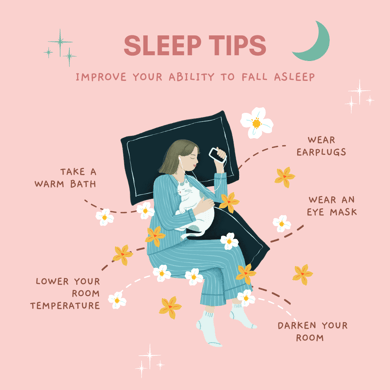As an entrepreneur who is no stranger to burning the midnight oil, I intimately understand the importance of quality rest. Between running a practice, being a parent to two, and keeping up-to-date on the latest medical treatments, I've grappled with the very issue I advocate for – sleep.
It's a concern I've observed in fellow leaders, a pervasive issue affecting productivity and well-being. In fact, a global study by the Center for Creative Leadership shed light on this very concern. It turns out, a whopping 42% of leaders are surviving on six hours or even fewer of sleep each night. Yep, that's right – the people who are at the helm of things are struggling to catch their Zs.
 Why sleep is important
Why sleep is important
Sleep is a fundamental physiological process crucial for maintaining optimal health and well-being. During sleep, the body undergoes intricate restorative mechanisms that are vital for various physiological functions.
Throughout the sleep cycle, essential nutrients are replenished, contributing to overall vitality. For instance, protein synthesis occurs during sleep, aiding in tissue repair and growth. Carbohydrate metabolism is also regulated, promoting stable blood glucose levels. Moreover, sleep provides an opportunity for the brain to clear waste products, like beta-amyloid plaques associated with Alzheimer’s, including toxic proteins that accumulate during wakefulness. This detoxification process is particularly important for cognitive function and long-term brain health.
Quality sleep involves falling asleep quickly, staying asleep without frequent interruptions, progressing through sleep stages for processes like memory consolidation, and waking up refreshed. Most adults should aim for 7 to 9 hours of sleep each night to promote optimal health and well-being.
How quality sleep makes you a better leader
We’ve all had that day when our boss shows up at the office without enough rest.
Research has revealed that when we're not well-rested, we're more prone to losing patience with our team members and even resorting to abusive behavior. Believe it or not, our charisma takes a hit too. This isn't just speculation—when bosses haven't slept well, they tend to exhibit more abusive behavior the following day, and unfortunately, that translates to lower levels of engagement among our dedicated team.
On a positive note, past studies have demonstrated that when we radiate positive emotions, our team members feel good, and they see us as more charismatic. Now, here's the kicker: bosses who consistently prioritize their rest tend to rate their team members as more likely to make the right decisions. It's a stark contrast to managers who sideline sleep.
So, it's clear that nurturing our own well-being, including a good night's sleep, isn't just about us—it's about empowering our team and driving success.
Ok, but how do I get quality sleep?
When it comes to sleep, in functional medicine, there are several principles to promote restful sleep. Part of it is about embracing a consistent rhythm—keeping a regular bedtime and wake-up schedule. Now, movement is important, but so is its timing; avoid intense exercise just before bed.
Steering clear of certain substances close to bedtime is a game-changer: avoid caffeine within seven hours and alcohol within three hours. Also, beware of blue light. Melatonin, a vital biochemical for facilitating sleep onset, is inhibited by light exposure, particularly the blue light emitted by screens. I've noticed that when I’m scrolling on my phone late in the night, I've not only compromised my sleep, but also my work engagement the following day.
Meditation and breathwork offer incredible support for achieving restful sleep. Breathwork techniques, like deep diaphragmatic breathing, activate the relaxation response, lowering stress hormones and promoting a tranquil state conducive to falling asleep. Lately, I've been using our BrainTap headset at PIH, which emits specialized light frequencies and calming audio to help unwind. Together, these practices create a serene mental environment, helping us unwind and transition into a peaceful sleep.
As someone who appreciates a data-driven approach, utilizing sleep-tracking apps offers a valuable means of enhancing overall health. Personally, I’m attached to my aura ring, which uses sensors that monitor heart rate, body temperature, and movement to analyze sleep stages and provide detailed insights for improving sleep quality and overall well-being. Not so techy? Keeping a sleep diary can enhance your sleep by helping you identify patterns, pinpoint sleep disruptors, and track progress.
If these aren’t enough, our practitioners can help find a complementary supplement to support your sleep.
Questions? Call PIH at 609.512.1468 for more information.
Takeaways
In my role as both an executive and a devoted mother, I've come to recognize the pivotal role that quality sleep plays in shaping not only my personal life but also my leadership abilities. The journey of prioritizing sleep has unveiled a profound truth: that by nurturing myself through rest, I am equipped to be a more effective and empathetic leader.
As I commit to better sleep habits, I find myself more attuned to the needs of my team, navigating challenges with greater clarity, and inspiring them through my own well-rested example. Quality sleep isn't just an indulgence; it's a strategic investment in your own resilience, enabling you to lead with vitality and compassion, both at work and at home.